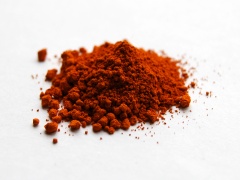Difference between revisions of "Alizarin"
| Line 1: | Line 1: | ||
| − | {{ | + | {{Infobox_Miscellaneous |
| image = Alizarin-sample.jpg | | image = Alizarin-sample.jpg | ||
| − | | origin = | + | | origin = Originally Central Asia and Egypt |
| − | | stowage factor = | + | | stowage factor = Density 1,54 g/cm<sup>3</sup> |
| − | |||
| humidity and moisture = - | | humidity and moisture = - | ||
| − | |||
| ventilation = - | | ventilation = - | ||
| − | | risk factors = | + | | risk factors = See text |
}} | }} | ||
==Description== | ==Description== | ||
| − | + | Alizarin is an organic compound that has been used throughout history as a prominent red dye, principally for dyeing textile fabrics. Historically it was derived from the [[roots]] of [[plants]] of the madder genus. In 1869, it became the first natural pigment to be duplicated synthetically.<br><br> | |
| − | + | Alizarin is the main ingredient for the manufacture of the madder lake [[pigments]] known to painters as Rose madder and Alizarin crimson. Alizarin in the commonest usage of the term has a deep red color, but the term is also part of the name for several related non-red dyes, such as Alizarine Cyanine Green and Alizarine Brilliant Blue. A notable use of alizarin in modern times is as a staining agent in biological research because it stains free calcium and certain calcium compounds a red or light purple color. Alizarin continues to be used commercially as a red textile dye, but to a lesser extent than 100 years ago.<br><br> | |
| − | <br><br> | + | |
| − | + | ||
| − | [[Category: | + | |
| + | |||
| + | [[Category: Other organic material]] | ||
[[Category:Products]] | [[Category:Products]] | ||
Revision as of 12:49, 7 August 2012
| Infobox on Alizarin | |
|---|---|
| Example of Alizarin |  |
| Facts | |
| Origin | Originally Central Asia and Egypt |
| Stowage factor (in m3/t) | Density 1,54 g/cm3 |
| Humidity / moisture | - |
| Ventilation | - |
| Risk factors | See text |
Alizarin
Contents
Description
Alizarin is an organic compound that has been used throughout history as a prominent red dye, principally for dyeing textile fabrics. Historically it was derived from the roots of plants of the madder genus. In 1869, it became the first natural pigment to be duplicated synthetically.
Alizarin is the main ingredient for the manufacture of the madder lake pigments known to painters as Rose madder and Alizarin crimson. Alizarin in the commonest usage of the term has a deep red color, but the term is also part of the name for several related non-red dyes, such as Alizarine Cyanine Green and Alizarine Brilliant Blue. A notable use of alizarin in modern times is as a staining agent in biological research because it stains free calcium and certain calcium compounds a red or light purple color. Alizarin continues to be used commercially as a red textile dye, but to a lesser extent than 100 years ago.











